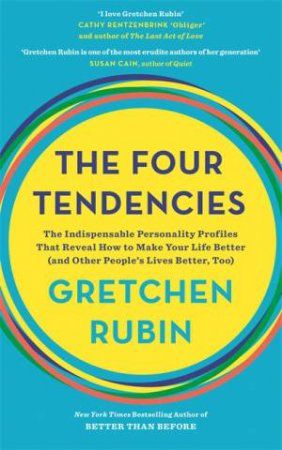The Four Tendencies – Gretchen Rubin

The four personality types.
There is no magic, one-size-fits-all answer for building a happier, healthier, more productive life.
Questioners have the self-direction of Upholders, the reliability of Obligers, and the authenticity of Rebels.
The Four Tendencies: Multiple Traits
People fit squarely into one of the four tendencies. If you want to get into more detail, then technically, people fit into one of eight primary-secondary combinations:
- Upholder-Questioner
- Upholder-Obliger
- Obliger-Upholder
- Obliger-Rebel
- Questioner-Upholder
- Questioner-Rebel
- Rebel-Obliger
- Rebel-Questioner
For example, a Questioner-Upholder is more likely to meet outer expectations than a Questioner-Rebel.
Don’t Box Yourself in With This Framework, Use It to Understand Your Own Behavior Better
It’s easy to get carried away with personality types like these, but that’s dangerous. When you chisel your tendency in stone you might accept it, but you’ll also turn it into an excuse and stop believing that you can change.
Use this concept to get to know yourself better, identify your strengths and weaknesses, and improve your relationships with others by being mindful of their tendencies.
Upholders: People Who Are Good at Upholding Their Commitments and Responsibilities
An Upholder is someone who gets things done efficiently and makes time for themselves as well. An upholder responds well to both other people’s expectations and their own personal ones, so they’re very reliable at work and get all of their tasks done without any trouble. Some upholders can be so obedient that they don’t question what the rules are and follow them without thinking. These people often become snitches because of their need to obey authority. They also tend to resist change, which is why they’re not as successful in life as others who are more critical thinkers.
The Four Tendencies: The Premise
The Four Tendencies is a personality profile framework to help you understand how you and the people around you deal with their outer and inner expectations, so you can better manage your life, work, and relationships.
Three primary benefits
1. Self-mastery in getting yourself to do things.
2. Influencing others to do things.
3. Understanding why others do or don’t do things, helps reduce frustration and increase harmony.
Questioners: The Quest For Logic And Purpose
Questioners turn all outer expectations into inner expectations if they believe they are reasonable and efficient. Thus, questioners only meet their own inner expectations.
Questioners excel at being logical and efficient in everything they do. But they can also be viewed as annoying for their constant questioning, unless they are very socially adept when asking those questions. Some random characteristics of questioners: they hate waiting in line, they love spreadsheets, and they love sharing articles.
Rebels: The Misfits
Rebels want to do what they want to do in their own way and on their own time. If someone else tells them to do the exact same thing, they will resist. They don’t even want to tell themselves to do something. They prefer to act out of freedom, choice, and self-expression.
Rebels might struggle with themselves because conventional advice doesn’t work for them. All the other tendencies tell them to set goals and get external accountability, but those things actually make it harder for rebels to do things because they feel a lack of freedom.
Upholders, Questioners, Obligers and Rebels
Upholders meet inner and outer expectations. They love rules, have a clear plan, and are self-motivated and disciplined.
Questioners meet their own expectations but resist outer ones. They need to see purpose and reason in everything they do.
Obligers meet other people’s expectations easily but struggle with their own.
Rebels defy both outer and inner expectations. Above all, they want to be free to choose and express their own individuality.
Obligers: The Biggest and Hardest Group to Be In
The largest group are Obligers.
Obligers often face the biggest inner struggle, because they always put everyone else before themselves.
This can culminate in self-sabotage through little acts of defiance that end up hurting themselves more than anyone else, for example failing a test on purpose, just to prove a point.

